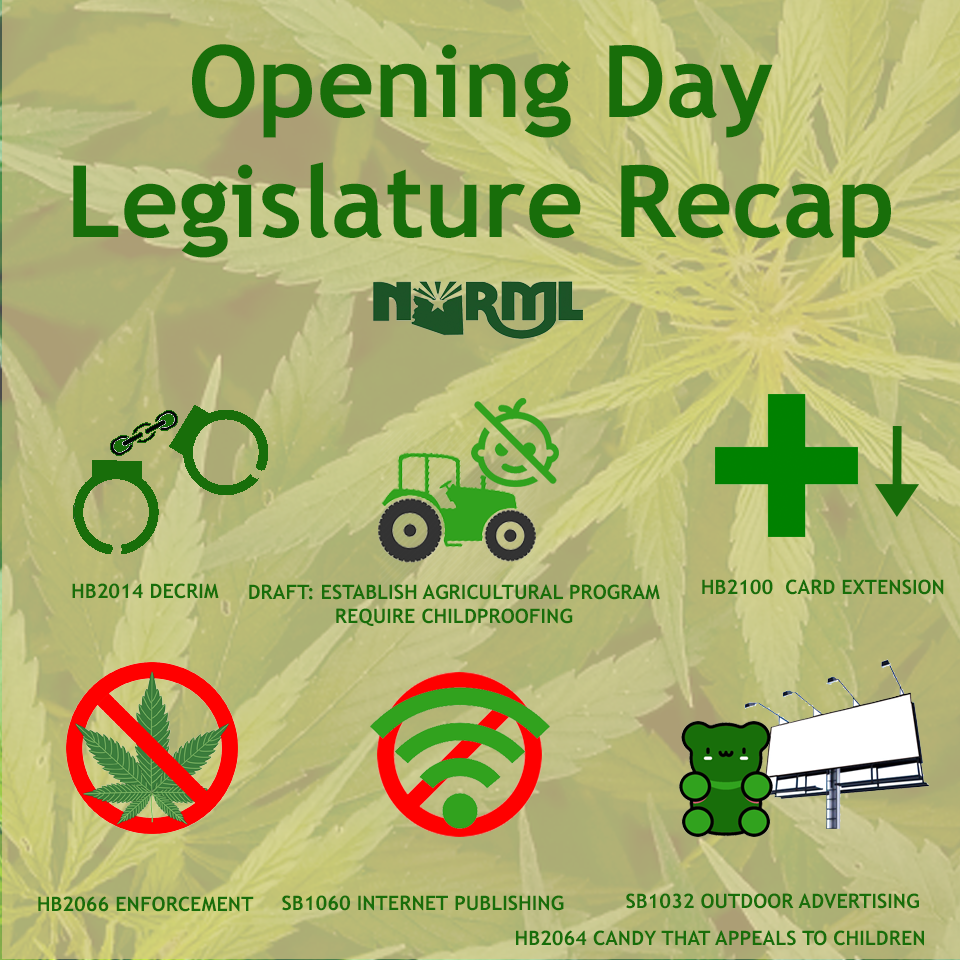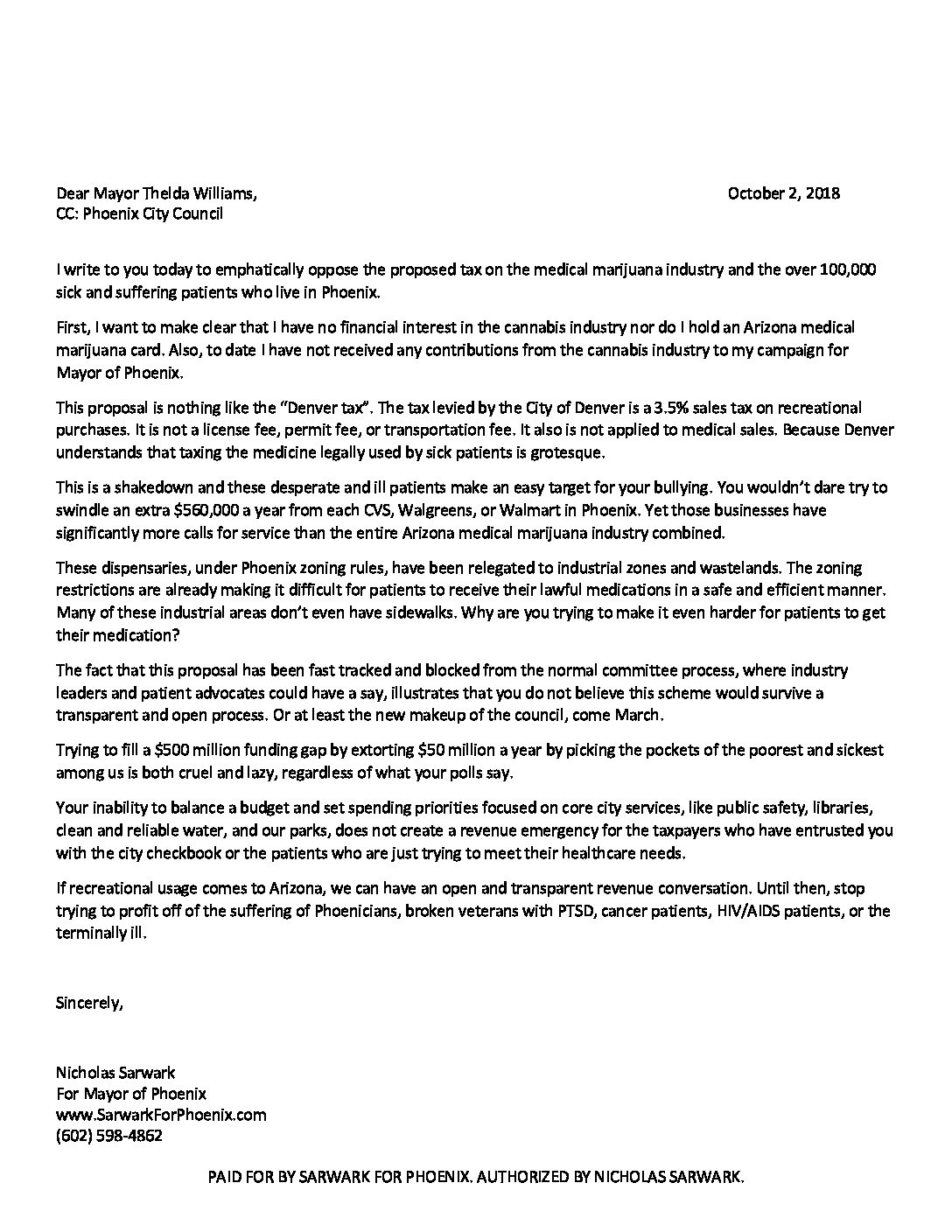Take Action: Read & Research
An urgent message from AZ NORML State Director, Mikel Weisser:
Opening Day at Legislature Report
By day two at the AZ state legislature 9 cannabis related bills have been filed and at least three are on their way.
The positive bills include, HB2014, the latest version of a decriminalization bill by Rep Mark Cardenas (D-LD19). Cardenas has introduced various versions of this bill for the past four sessions. This round, possessing less than one ounce would be reduced to a $100 fine. Currently in AZ, any cannabis possession can be charged as a felony. Cardenas also has a bill in the draft stage calling on the federal government to keep their hands-off Arizona’s state medical program.
Another returning champion of marijuana reform is Rep Pam Powers-Hannely (D-LD9). Her bill, HB2100 would address the high AZ patient card cost by extending a card from one year to five. Hannely filed similar legislation in the 2017 session. A friend of AZ-NORML and a medical card holder, Hannely is the former head of the state’s Democratic Progressive Caucus and medical journal editor. Hannely also has a draft bill to lower card costs.
A returning foe of cannabis reform, Rep Vince Leach (R-LD11) has filed six bills that attack the state’s medical marijuana program. HB2063 declares any active or inactive metabolites of any controlled substance, including cannabis. In this case inactive metabolites could not prove impairment, but would still be evidence of prior possession.
HB2064 prohibits cannabis product, packaging and marketing designs that might be construed as intended to appeal to children.
Leach’s HB2066 dips into the state’s $38million dollar MMJ fund to pay for enforcement, education and prevention awareness. Since the state’s medical marijuana program has mushroomed to be the 1/3 largest in the country, now at 150,000, (generating $19 million in local sales taxes in 2016), preventing new patients from joining is counter-productive.
HB2067 targets the state’s medical card certification clinics by making knowingly or intentionally falsely approving medical card patients a class 6 felony.
HB2068 declares that drivers convicted of cannabis DUI may have their medical card rights suspended while on probation.
In the Senate, anti-cannabis Sen. David Farnsworth (R-LD16) has three bills targeting the industry. The bill garnering the most attention is SB1032, which prohibits cannabis outdoor advertising along highways.
SB1060 targets the internet equivalent and makes publishing erroneous information about the address or products of a dispensary a class six felony.
Farnsworth’s SB1061 is an attempt to grab five million dollars from the state’s medical marijuana fund to pay for a study of the program.
AZ-NORML and the Arizona Marijuana Industry Trade Association have been working with Sen Sonny Borrelli (R-LD5) on two pending bills. The first is a 2nd try on creating a state hemp program through the Dept. of Ag. Borrelli’s 2017 version of this bill gained national attention when it cleared both the Senate and the House near-unanimously only to be vetoed by the governor. Ag Sec. Mark Killian called for the veto over funding issues for launching the pilot program. This round Borrelli has soothed out the funding issues and expects early support.
More significantly, after more than seven months of stakeholder meetings with advocates, patients and industry leaders, this session Borrelli is attempting the make significant changes in the state medical program. At press time (10pm Jan. 9, 2018), the long-awaited bill is still in draft stage, but a few key issues have been determined. First the state will shift regulation of the production of cannabis to the Dept. of Agriculture and cannabis will be deemed an “agricultural product.” Two, all cannabis products will be tested for health, safety and potency and sold in child-proof packaging. Additionally, the bill allows for dispensary operations to only purchase one “dispensary agent” license per employee. Currently agents are required to have separate cards for each facility where they work.
Most importantly the bill will lower patient card costs. Unlike the hemp bill, this regulatory package will be required to pass by 3/4s vote in both the House and Senate since it is modifying a law created by voter initiative.









Leave A Comment
You must be logged in to post a comment.